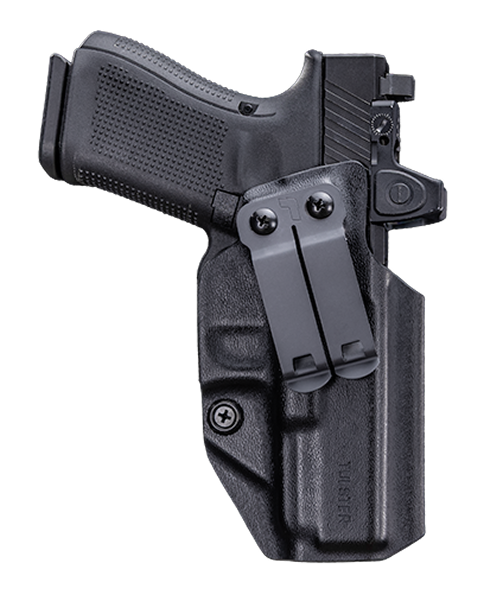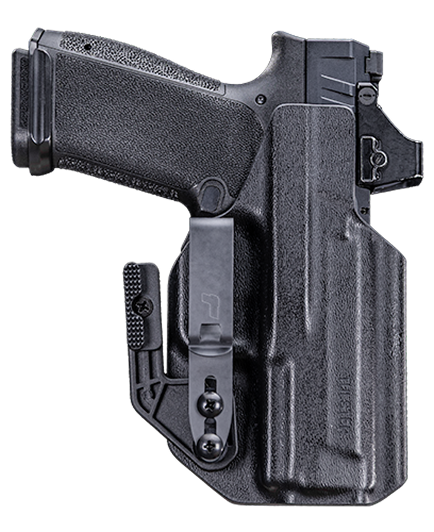Opinion Piece: Open Carry vs. Concealed Carry
Posted by GunSpot, Tulster on Sep 1st 2021
If you’re an avid participant in gun forums or you enjoy chatting with other enthusiasts on social media, you will know that one of the biggest debates is open carry vs concealed carry. To say there are varying opinions on this topic is an understatement. So, is concealed carry or open carry best?
Well, your decision is going to depend on where you live and the laws you must abide by, as well as your own personal preference. Plus, there are different applications for both concealed carry and open carry.
Considering the alternatives, in this blog post, we will assess both schools of thought in further depth so that you can get a better understanding and make up your own mind about which approach is best for you.
What Does the Second Amendment Actually Say?
A good place to start is by referring to what the Second Amendment says:
“A well regulated Militia, being necessary to the security of a free State, the right of the people to keep and bear arms shall not be infringed.”
The Second Amendment purely reinforces that the right to bear arms is inherent, rather than granted. It does not reference how to bear and keep arms and does not dictate how your firearm should be carried.
Nevertheless, it is worth pointing out that there are different laws in different states, so you will need to understand the regulations in your location.
What Is Open Carry?
Let’s start by taking a look at open carry, which means a person has the legal right to carry a firearm openly in a vehicle or on foot. At present, there are 31 states that enable individuals to carry a handgun openly without a license or permit. Furthermore, there are 15 states that require a permit for a handgun to be carried. Finally, people are prohibited from openly carrying handguns in public in five states. These five states are as follows:
- South Carolina
- New York
- Illinois
- Florida
- California
The same also applies to the District of Columbia.
The following states otherwise restrict people from being able to carry their handguns openly in public:
- Washington
- Virginia
- Pennsylvania
- North Dakota
- Missouri
- Alabama
Other states are licensed open carry states. This means that in order to openly carry a handgun, a permit is needed. In New Jersey, Minnesota, and Massachusetts, long guns cannot be openly carried. The states with these laws are as follows:
- Utah
- Texas
- Tennessee
- Rhode Island
- Oklahoma
- New Jersey
- Minnesota
- Massachusetts
- Maryland
- Iowa
- Indiana
- Hawaii
- Guam
- Georgia
- Connecticut
- American Samoa
The remaining 31 states allow individuals to carry a gun openly in public places. It is critical to note, though, that firearms are still prohibited in some locations, even in permissive open carry states. Examples of such locations may include state-owned buildings, places where alcohol is sold, some public transportation in certain states, schools, and some churches.
Proponents of open carry believe there are a number of different benefits associated with open carry and reasons why they believe that this is the best approach. Some of these may include the following:
- You let other people know that you are armed, which may cause possible criminals to think twice when they see that you have a weapon since most criminals are after easy targets.
- You can keep your firearm close and accessible during sporting activities. Concealed carry may be more difficult for hikers, bicyclists and the like to have their firearms accessible when required.
- You may have better access to your firearm and are able to more quickly draw it effectively.
- You’ll benefit from greater comfort while carrying your firearm.
The Benefits of Conceal Carry
Next, we have the concealed carry option. This refers to the practice of carrying a handgun in public in a concealed manner, either in close proximity to the user or on your person. Carrying a concealed weapon tends to be a matter of self-defense. Advocates of this approach recognize a number of benefits associated with conceal carry.
One of the main reasons why people advocate this approach is so that it does not cause mass hysteria and panic. When someone openly carries a gun, some say it could potentially cause unease for those around them.
Some people also argue that conceal carry is better for self defense, stating that a criminal, especially a hardened or violent criminal, would likely make any person openly carrying a gun their first target, which is why they choose to keep it concealed.
Of course, you need to make sure that you are aware of the requirements in your state in terms of concealed carry and the licenses or permits needed. For example, South Carolina is a “shall issue” state, which means you need a South Carolina Concealed Weapons Permit for conceal carry. Fingerprinting and paperwork are required. In New York, the state is a “may issue” state, which means you can only acquire a concealed carry permit if you already have a New York pistol license. Once you have carried out a handgun safety course, you will need background checks, fingerprinting, four references, and the approval of a licensing commissioner or judge.
The Final Point
As you can see, there are pros and cons associated with both options. If you open carry, you may be able to get to your weapon faster, but you may be more likely to become the first target for a criminal as well. Concealing your weapon gives you an element of surprise, but you may need to go through an extensive process to get a permit.
While ultimately it is up to personal preference, we here at Tulster are huge proponents of concealed carry. However, you have the right to carry how you please, and you may be unable to conceal; it is all about figuring out what is going to be right for you. You should consider the rules and regulations in the state in which you reside.
If you’re looking for the right holsters and accessories, or you want to upgrade your current holster, many are available here on our site.
DISCLAIMER: This content is for general educational and informational purposes only. Readers and viewers are responsible for knowing and understanding all appropriate local, national and international laws relating to self-defense, reasonable force, and the use of any and all weaponry, acting in accordance with all applicable laws, at all times. Neither Gunspot or Tulster assume any responsibility for the use or misuse of information or instruction. We encourage all firearm owners to seek out professional in-person instruction. No video or blog replaces in-person training with qualified professionals to ensure you learn and train safely.









